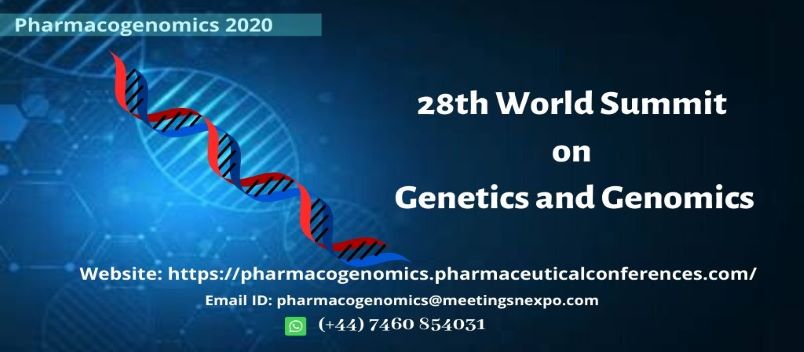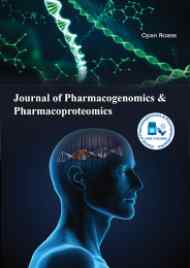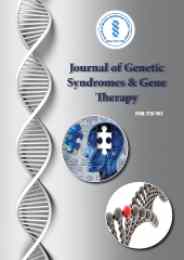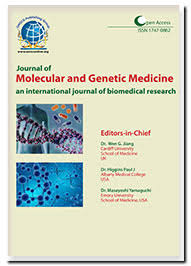Theme:
pharmacogenomics-2020
On behalf of the Organizing and Advisory Committee we take great pleasure in welcoming Geneticist, Genomics Scientists, Pharmacology Scientists, Pharmacology Health Professionals, Genetics Associations and Societies, Genetic Counselors, Bio pharmacists, academicians, scientists, researchers, students and experts of application fields to the 28th World Summit on Genetics and Genomics going to take place on July 27-28, 2020 in Madrid, Spain to foster the progress in the field by contributing with your expertise to what promises to be a very comprehensive and exciting meeting, and to enjoy the immense unique artistic heritage and wonderful landscape of Spain.
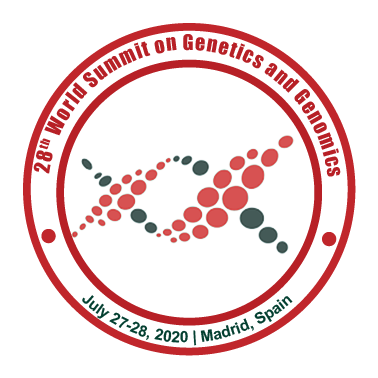
The theme of the Conference “Exploring Novel Therapies in Genetics and Genomics Research” will underpin the need for collaboration and cooperation of individuals from a wide range of professional backgrounds. It aims to promote awareness and enhance research aiming in developing solutions for the various Genetics and Genome Research encountered.
Plant Genomics
Plant genomics intends to sequence, describe, and study the genetic compositions, structures, associations, functions, and interactions/networks of an entire plant genome. Its development and advances are tightly interconnected with proteomics, metabolomics, metagenomics, transgenomics, genomic selection, bioinformatics, epigenomics, phenomics, system biology, present day instrumentation, and robotics sciences. Plant genomics has altogether progressed in the course of recent decades in the place that is known for cheap, high-throughput sequencing innovations and completely sequenced more than 100 plant genomes. These advances have wide implications in each part of plant biology and breeding, powered with novel genomic selection and manipulation tools while generating many grand challenges and tasks ahead. This Plant genomics provides some updated discussions on current advances, difficulties, and future perspectives of plant genome studies and applications.
Pharmacogenomics
In pharmacogenomics, genomic information is used to study individual reactions to drugs. When a gene variant is associated with a particular drug response in a patient, there is the potential for making clinical choices dependent on genetics by adjusting the dosage or picking an alternate drug, for example. Scientists assess gene variants affecting an individual's drug response the same way they assess gene variants associated with diseases: by identifying genetic loci associated with known drug responses, and then testing individuals whose response is unknown. Present day approaches incorporate multigene analysis or entire genome single nucleotide polymorphism (SNP) profiles, and these approaches are just coming into clinical use for drug discovery and development.
DNA Sequencing
Sequencing DNA means deciding the order of the four chemical building blocks - called "bases" - that make up the DNA molecule. The sequence tells scientists the sort of genetic information that is conveyed in a specific DNA segment. For instance, scientists can utilize sequence information to determine which stretches of DNA contain genes and which stretches carry regulatory instructions, turning genes on or off. In addition, and importantly, sequence data can feature changes in a gene that may cause illness.
Animal genetics
Animal Genetics analyzes the heredity and varieties in animals. Animals have an autonomous legacy of characters due to their generous number of chromosomes. Half breed Analysis is the key strategy to consider the legacy of characters and it picks the possibility of different morphological, physiological and biochemical characteristics which a huge piece of the time depend just on one of a few arrangements of characteristics.
Immuno genetics
Immunogenetics is the study of the genetic basis of the immune response. It incorporates the study of normal immunological pathways and the identification of genetic variations that outcome in immune defects, which may result in the identification of new therapeutic targets for immune diseases.
Genetic Engineering
Genetic engineering, now and then called genetic modification, is the way toward changing the DNA in a life form's genome. This may mean transforming one base pair (A-T or C-G), erasing an entire locale of DNA, or presenting an extra duplicate of a gene. It may also mean removing DNA from another organism’s genome and joining it with the DNA of that person. Genetic engineering is used by researchers to enhance or modify the characteristics of an individual organism. Genetic engineering can be applied to any organism, from a virus to a sheep. For example, genetic engineering can be used to produce plants that have a higher nutritional value or can endure exposure to herbicides.
Cell Biology
Cell biology is the study of cells and how they work, from the subcellular processes which keep them functioning, to the manner in which that cells cooperate with different cells. Whilst molecular biology focuses to a great extent on the molecules of life (largely the nucleic acids and proteins), cell biology concerns itself with how these molecules are used by the cell to survive, reproduce and carry out normal cell functions. In biomedical research, cell biology is used to discover more about how cells normally work, and how disturbances in this normal function can result in disease. A comprehension of these procedures can prompt treatments which work by focusing on the abnormal function.
Genetically Modified Organisms
Genetically modified organisms (GMOs) can be characterized as organisms (i.e. plants, animals or microorganisms) in which the genetic material (DNA) has been altered in a way that does not occur naturally by mating and/or natural recombination. The technology is often called “modern biotechnology” or “gene technology”, some of the time additionally “recombinant DNA technology” or “genetic engineering”. It enables chosen singular genes to be moved from one organism into another, also between nonrelated species. Foods produced from or using GM organisms are often referred to as GM foods.
Genetic Fingerprinting
Genetic Fingerprinting laboratory technique used to set up a connection between biological evidence and a suspect in a criminal investigation. A DNA sample taken from a crime scene is compared with a DNA sample from a suspect. If the two DNA profiles are a match, then the evidence came from that suspect. Conversely, if the two DNA profiles do not match, then the evidence cannot have come from the suspect. DNA fingerprinting is also used to establish paternity.
Genome Medicine
Genomic medicine is an emerging medical discipline that involves using genomic information about a person as a major aspect of their clinical care (e.g. for diagnostic or therapeutic decision-making) and the health results and policy implications of that clinical use. As of now, genomic medicine is making an impact in the fields of oncology, pharmacology, rare and undiagnosed diseases, and infectious disease.
Molecular Genetics and Molecular Evaluation
The term molecular genetics sometimes alludes to an essential theory claiming that genes direct all life processes through the production of polypeptides, sometimes to a more modest basic theory about the expression and regulation of genes at the molecular level, and sometimes to an investigative approach applied throughout biomedical science that is based on investigative strategies grounded in the basic theory about genes. Molecular evolution is the process of change in the sequence composition of cellular molecules such as DNA, RNA, and proteins across generations. The field of molecular evolution uses principles of evolutionary biology and population genetics to explain patterns in these changes.
Tissue Engineering and Bio banking
Tissue engineering is a multi-disciplinary science including the principles of cell biology, engineering and material sciences to replace or reestablish biological tissues which play out a specific function with a better framework. It is an act of combining the cells of construct, scaffold and growth factors into a functional tissue. The possibility of bone-marrow derived mesenchyme stem cells, cardiac valves, auricular cartilage reconstruction, etc. Bio banking is a procedure where samples of body fluid or tissues are collected for research use to improve health and disease. Other information’s, for example height, weight and any questions regarding health (e.g. family history and lifestyle) also be recorded to provide the context for the samples.
Functional Genomics
Functional genomics is the study of how genes and intergenic regions of the genome add to various biological processes. A researcher in this field typically studies genes or regions on a “genome-wide” scale (i.e. all or multiple genes/regions at the same time), with the expectation of narrowing them down to a list of candidate genes or regions to analyses in more detail. The objective of functional genomics is to decide how the individual components of a biological system work together to produce a particular phenotype. Functional genomics focuses on the dynamic expression of gene products in a specific context, for example, at a specific developmental stage or during an infection.
Genome Sequencing and Annotation
Genome sequencing is the most immediate strategy of detecting mutations, for example single nucleotide polymorphisms (SNPs) and copy number variations (CNVs). Genome annotation is the way toward recognizing any functional element along the DNA sequence of a genome, yet at beginning stages often focuses on genes. It consists of three main steps: recognizing components on the genome that do not code for proteins, identifying elements on the genome, a process called gene prediction, and attaching biological information to these components.
Stem Cell Research and Therapy
Stem-cell research is the area of research that studies the properties of stem cells and their potential use in medicine. Stem Cell Therapy is the treatment for various disorders which non-seriously life-threatening by using stem cells. These stem cells can be obtained from a variety of sources and used to potentially treat more than 80 disorders which include neuromuscular, organ, chronic and degenerative disorders. Stem cell therapy is currently being researched for the treatment of various diseases. While research and clinical trials are in process with changing degrees of success, stem cell therapy holds the potential to offer a successful cure for these conditions.
Breeding and Germplasm Development
Breeding is the use of genetic principles in animal husbandry, agriculture, and horticulture to improve desirable qualities. Breeding and Germplasm Development is a generally normal and important technique used to develop new plants from the germplasm. Germplasm can be described as living cell or tissue from which new plants can be developed.
Clinical Genetic research
Clinical genetics involves the study, counseling and treatment of individuals and families with heritable disorders and disease predisposition. Clinical genetic testing alludes to the laboratory analysis of DNA or RNA to aid in the diagnosis of disease. Genetic testing can give definitive diagnosis as well as help predict the likelihood of developing a particular disease before symptoms even appear. It can tell if an individual is carrying a specific gene that could be passed on to his or her children and sometimes it can give information as to whether some treatments will work before a patient beginnings therapy treatment.
Cancer Genetics
Cancer is not inherited. It is only the genetic defect that can prompt to cancer that is inherited, which implies that the inclination to getting cancer, or increased risk, can be inherited. However, this is not common. As indicated by current estimates, just around one of every 10 cases of cancer are associated with hereditary predisposition. A genetic disposition to cancer can be identified by the onset of cancer occurring at a very young age or that many closely related members of the same family suffer from the same type of cancer. The genetic defects that incur a predisposition to cancer are varied. They can be rare, they may include genetic changes that represent a high cancer risk, or ones that carry only a low risk, or then somewhere in between.
Epigenomics
Epigenomics is the study of the reversible epigenetic modifications that influence gene expression and regulation without altering the DNA sequence itself. Epigenomics is the study of the epigenome, which is a multitude of chemical compounds that direct the functioning genome as a whole. These compounds tie to the DNA to enact or deactivate specific genes in the genome, thereby altering the way that it behaves. As a result, the epigenome may play a role in the regulation of protein production in some cells of the body.
Genomic and Biofuels Development
Genomics may be a key factor in tending to the worldwide energy crisis. Through their insight in this field, scientists are building up a better understanding of how to harness different renewable energy sources, such as lignocellulosic biomass, microalgae, and cyanobacteria. Besides, it appears that genetic engineering of enzymes will be a key factor in optimizing development of sustainable biofuels that can someday replace fossil fuels on a global scale. Genomic information gathered from across the biosphere, including potential energy crops and microorganisms able to break down biomass will be vital for improving the prospects of significant cellulosic biofuel production.
Comparative Genomic Hybridization
Comparative genomic hybridization (CGH) is a molecular cytogenetic strategy for the identification and mapping of chromosomal gains and losses. It depends on the cohybridization of differentially labeled test and reference DNAs onto metaphase spreads, which usually have been prepared from peripheral blood lymphocytes of a healthy donor. The signal intensity ratios of the two labels along the chromosomes then reflect DNA copy number changes in the test genome comparative with the reference genome.
Microbial Genomics
Microbial Genomics is a field of science that analyzes and compares the complete genome (genetic material of an organism) of a microorganisms or an enormous number of genes in a simultaneous manner. Microbial genomes are widely variable and reflect the enormous diversity of bacteria, archaea and lower eukaryotes. Bacterial genomes usually comprise of a single circular chromosome, but species with more than one chromosome (eg. Deinococcus radiodurans), linear chromosomes (eg. some Bacillis subtilis strains) and combinations of linear and circular chromosomes (eg. Agrobacterium tumefaciens) also exist.
Human Genetics and Genomics
Human genetics is the study of the inheritance of characteristics by children from parents. Inheritance in humans doesn't vary in any fundamental way from that in other organisms. The human genome is the finished arrangement of nucleic corrosive successions for individuals, encoded as DNA inside the 23 chromosome combines in cell cores and in a little DNA particle found inside individual mitochondria. These are typically treated independently as the atomic genome, and the mitochondrial genome.
Gene Therapy and Genetic Counseling
Gene therapy is a preliminary strategy that uses qualities or essentially nucleic corrosive polymers to treat or forestall malady into a patient's cell as a medication for illness treatment. Later on, this technique may enable specialists to treat confusion by embedding’s a quality into a patient's cells as opposed to using drugs or medical procedure. Gene Therapy is a way to settle a hereditary issue at its center or source. The polymers are either converted into proteins which meddle with the objective quality articulation or else they could rectify hereditary changes. Genetic counseling is the methodology by which an individual or people in danger of any acquired issue are informed and made mindful with respect to the results and nature of the confusion, and the likelihood of creating or transmitting it.
Proteomics and Metagenomics
Proteomics relates to the comprehensive analysis of expressed proteins from a cell, a multicellular system, an extracellular environment, or a large set of recombinant clones. This is accomplished utilizing combinations of protein separation, identification, and/or assay techniques, such as liquid chromatography-mass spectrometry (LC-MS), two-dimensional gel electrophoresis-mass spectrometry (2DE-MS), affinity purification-mass spectrometry (AP-MS), and protein- or antibody-based microarrays. Metagenomics is the process by which the metagenome is generated: it includes sequencing all DNA extracted from a sample followed by assembly of sequence reads or mapping them to a reference database followed by annotation of the genes.
Conference Series will be hosting 28th World Summit on Genetics and Genomics in 2020. This exciting event is scheduled during July 27-28, 2020 at Madrid, Spain strives to bring many Prominent Speakers, Professors, Deans, Surgeons, Physicians, Medical and Industrial Professionals, Young Researchers, Student Delegates and Business Delegates, along with information-packed Workshops, will fill the agenda. Genetics and Genomics 2020 will provide a wonderful experience that will strive to offer plenty of networking opportunities, providing you with the opportunity to meet and interact with the leading scientists and researchers, friends and colleagues as well as sponsors and exhibitors.
Genetics is study of heredity in general and of genes in particular. Genetics forms one of the central pillars of biology and overlaps with many other areas, such as agriculture, medicine, and biotechnology. Genomics is the study of whole genomes of organisms, and incorporates elements from genetics. Genomics uses a combination of recombinant DNA, DNA sequencing methods, and bioinformatics to sequence, assemble, and analyze the structure and function of genomes.
In addition to the informational speakers, you will get an opportunity to interact with and learn from our Business Partners, Exhibitors and Sponsors. Also, you will get an opportunity to speak with them and personally evaluate if they can be helpful to our practices. And then there are our peers…the opportunities to get to know them and learn from each other during networking breaks.
So, bookmark the dates: July 27-28, 2020; we assure you that Genetics and Genomics 2020 would be a great learning and knowledge sharing experience. Keep your eyes peeled for more information to follow.
We are looking forward to seeing you at 28th World Summit on Genetics and Genomics in Madrid, Spain.
Salient Features:
- Well-structured workshops, events and symposia
- Renowned speakers and scientists across the globe
- Poster presentations and world class exhibits
- Panel discussions & interactive sessions
- Perfect platform for global networking
- B2B meetings
- Alliances and associations
- Collaborative Research opportunities
Target Audience:
- Genomics Researchers
- Genomics Faculty
- Genomics Scientists
- Genomics Colleges
- Pharmacology Scientists
- Pharmacology Health Professionals
- Genetics Associations and Societies
- Geneticists
- Genetic Counselors
- Biopharmacists
- Business Entrepreneurs
- Training Institutes
- Software developing companies
- Data Management Companies
Abstract Submission Guidelines:
- The length of the abstract should not more than 300 words.
- The title of the conference must be in Sentence case.
- There should be name of the author and co-authors (if any).
- Your full name, affiliation (degree, institution/ company/ University name, address, contact number and email address) must be mentioned here.
- Short biography of the author must not exceed from 100 words.
- They must be submitted before the deadlines.
- All the abstracts will be reviewed by the committee and you will get a email within 24-48 hours after submission of your abstract.
- All the accepted abstracts will be published in the conference proceeding books.
Abstract Submission Link: https://pharmacogenomics.pharmaceuticalconferences.com/abstract-submission.php
The Young Researchers Forum offers young researchers the possibility to meet and discuss research topics and methodologies, share and develop ideas, learn from each other and gain knowledge from senior researchers.
Young Researcher Sessions are organized at the World Summit on Genetics and Genomics to provide a unique platform for Young Researches/Investigators for presenting the latest research projects with an in-depth analysis. Genetics and Genomics 2020 cordially invite Young Researchers from Universities/Institutes/Industries to present a short oral presentation during the forum. These oral presentations should be of 10 minutes duration in related scientific track followed by 5 minutes question hour. Therefore, presenters are encouraged to give comprehensive and dynamic talks. Applications will be selected based on past research productivity and future promise.
|
Conference dates |
July 27-28, 2020 |
|
Early Bird Registration |
January 31, 2020 |
|
Abstract Submission |
December 01, 2019 |
Genetic Testing Market Scenerio:
Genetic Testing Market size is estimated to exceed USD 25 billion by 2025; according to a new research report by Global Market Insights, Inc.
Surging demand for personalized medicines will escalate demand for genetic testing in near future. Every individual has different genetic makeup and require personalized medicines to treat diseases effectively. Genetic testing assists in early detection of rare genetic diseases that helps to treat them in early stages. Rising awareness regarding personalized medicines coupled with benefits of early diagnosis will escalate business revenue in forthcoming years.
Availability of technologically advanced gene diagnosing kits will surge its demand over the forecast period. Industry players are emphasizing on R&D activities to manufacture innovative products that provide efficient and safer techniques for disease detection. Moreover, advanced products such as direct to consumer genetic testing kits will serve to be a high impact rendering factor, thereby fueling market growth over the forecast period. However, dearth of experienced professionals and lack of healthcare infrastructure in developing and underdeveloped countries may hamper industry growth to certain extent.
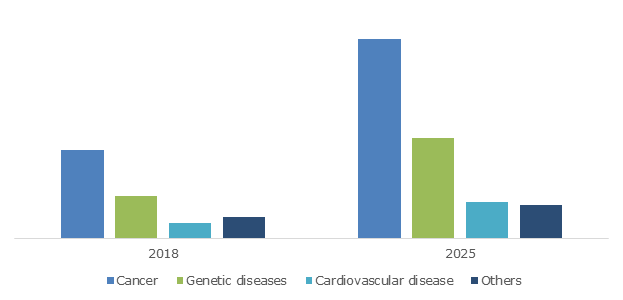
Carrier testing segment of was valued around USD 460 million revenue in 2018 and it is anticipated to witness tremendous growth in coming years. Carrier type of testing helps in determining autosomal recessive disorders. The test is prominently used by couples to determine the chances of having child with genetic disorders. Moreover, carrier testing is used to detect whether a healthy person is a carrier of mutated genes. These factors enable healthcare professionals to recommend treatment for individuals comprising mutated genes that will exceed segment revenue in forthcoming future.
Cancer diagnosis segment of genetic testing market is anticipated to witness more than 12% growth over the forecast timeframe. Significant growth can be attributed to rising prevalence of oncological disorders. Genetic screening tests enable identification of mutations and functional characterization of the individual’s genetic alterations that assists in accurate cancer diagnosis. Benefits of early detection of cancer will stimulate genetic testing industry growth in forthcoming future.
Global Genomic Market Overview:
The global genomics market is projected to reach USD 35.7 billion by 2024 from USD 18.9 billion in 2019, at a CAGR of 13.5% during the forecast period. Factors such as the rising government funding and growth in the number of genomics projects, decreasing sequencing costs, growing application areas of genomics, and the entry of new players and start-ups in the genomics field are driving the growth of the market. However, the high cost of genomic equipment could limit market growth to a certain extent in the coming years.
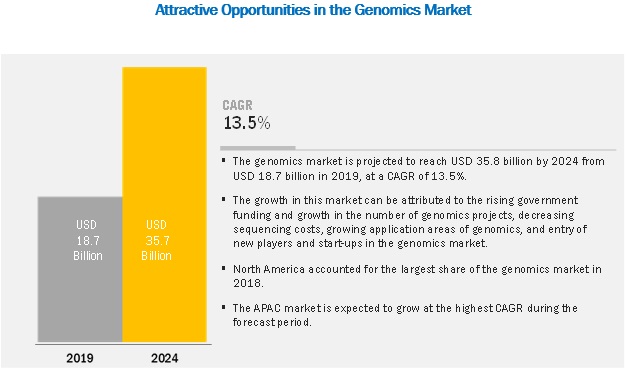
Conference Highlights
- Plant Genomics
- Pharmacogenomics
- DNA Sequencing
- Animal genetics
- Immuno genetics
- Genetic Engineering
- Cell Biology
- Genetically Modified Organisms
- Genetic Fingerprinting
- Genome Medicine
- Molecular Genetics and Molecular Evaluation
- Tissue Engineering and Bio banking
- Functional Genomics
- Genome Sequencing and Annotation
- Stem Cell Research and Therapy
- Breeding and Germplasm Development
- Clinical Genetic research
- Cancer Genetics
- Epigenomics
- Genomic and Biofuels Development
- Comparative Genomic Hybridization
- Microbial Genomics
- Human Genetics and Genomics
- Gene Therapy and Genetic Counseling
- Proteomics and Metagenomics
To share your views and research, please click here to register for the Conference.
To Collaborate Scientific Professionals around the World
| Conference Date | July 27-28, 2020 | ||
| Sponsors & Exhibitors |
|
||
| Speaker Opportunity Closed | |||
| Poster Opportunity Closed | Click Here to View | ||
Useful Links
Special Issues
All accepted abstracts will be published in respective Our International Journals.
- Journal of Pharmacogenomics & Pharmacoproteomics
- Journal of Molecular and Genetic Medicine
- Journal of Genetic Syndromes & Gene Therapy
Abstracts will be provided with Digital Object Identifier by

